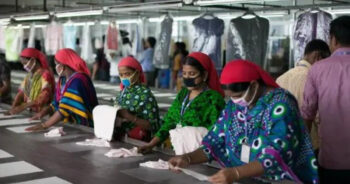 The Bangladesh Garment Manufacturers and Exporters Association (BGMEA) has called on brands and retailers to pay more for future orders in a bid to offset the rising living costs of workers across the country’s garment and textile manufacturing industry.
The Bangladesh Garment Manufacturers and Exporters Association (BGMEA) has called on brands and retailers to pay more for future orders in a bid to offset the rising living costs of workers across the country’s garment and textile manufacturing industry.
The plea from BGMEA President Faruque Hassan follows the recent request from major buyers of Bangladesh-made goods, including H&M, Inditex and Primark, for the country’s RMG (readymade garments) Minimum Wage Board to substantially increase minimum salaries for workers in Bangladesh.
In an open letter to brands and retailers, Hassan noted that while the new minimum wage structure is currently under review and is expected to be implemented by the end of the year, buyers should take this into account when placing upcoming orders, particularly for products scheduled to be produced from December onwards.
“Inflation and production cost hikes, including gas, electricity, fuel, transport, and other costs, are squeezing our breathing space,” he wrote. “In fact, the workers, who are the lifeline of this industry, are suffering the most from the inflation.”
Whilst RMG product prices have increased to some extent, Hassan also confirmed that these changes insufficient to offset the rising costs.
“You may know that the minimum wage board for garment workers will review the current minimum wages,” he added. “The board members are visiting factories and engaging in discussions with both workers and owners.”
“I believe before the end of this year a new minimum wage will be declared and there will be quite a significant increase, if we look at the trend of previous reviews, as well as the aggregate inflation in the past five years.”
According to Bangladeshi labour laws, new wages have to be fixed every five years. The current minimum wage in the garment sector is $73 per month, a figure that has been in place since December 2018. Meanwhile, labour rights groups are demanding a minimum salary of $209 per month.
Earlier this month, members of the Action, Collaboration, Transformation (ACT) initiative set out their support for higher salaries in a letter to the wage board.
The ACT letter urgently called on the RMG Minimum Wage Board to “agree through a peaceful process to a higher minimum wage for the sector”, and urged the sector to respect freedom of association and collective bargaining rights.
As well as H&M, Inditex and Primark, other signatories included ASOS, Bestseller, Big W, C&A, Cotton On Group, Esprit, G-Star Raw, Kmart, Lidl, New Look, Next, Pentland, PVH, Tchibo, Tesco and Zalando, as well as the IndustriALL global union.





















